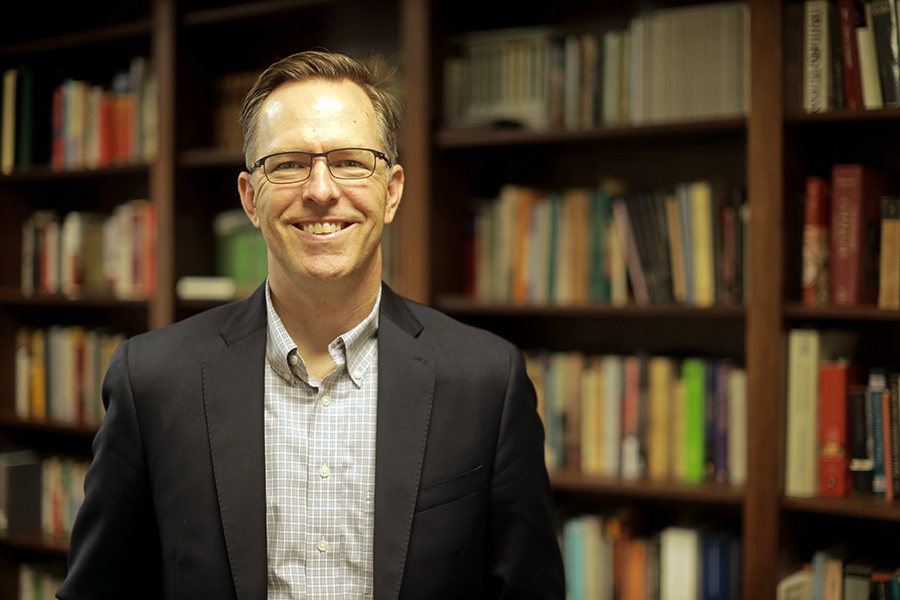Q&A with Great Texts Program Director William Weaver, Ph.D.
After nearly one year at the helm, Great Texts Program Director William Weaver reflects in this Q&A on his new role and expands on what makes studying Great Texts so transformative.

What inspired you to take on the role of Director of the Great Texts program?
The Great Texts Program has been my academic home since I completed my Ph.D. in English and Comparative Literature in 2007. It’s a great home for scholarship and teaching. During those years I’ve seen many students transformed by their reading of great books. I love my colleagues and students, and I was glad for an opportunity to serve in this way.
It’s been nearly one year since you assumed this role. What have been the highlights, challenges, and surprises during this time?
The highlights have been meeting colleagues across the Honors College and University, working with the dean and program directors, and a fall event featuring GTX alumna Christine McIntire (BBA ’19).
The main challenge has been that academic leadership is very different from scholarship, which has been my main area of work outside the classroom. It’s a welcome challenge, and I’ve got some great examples around me, including my predecessors Phil Donnelly and Scott Moore.
Regarding surprises, it’s been a pretty calm year, honestly. Many people, including some former students, have reached out to express their gratitude and support, which has been great.
The program delves into timeless literary works. Which text has had the most profound impact on you personally?
Probably Virgil’s Aeneid. I credit this poem and my AP Latin instructor, with whom I initially read it, with first teaching me how to read well and motivating me to read literature. It follows the wanderings and trials of the legendary hero Aeneas. Although a pagan poem, its portrait of a divinely guided hero and a providentially ordered world resonated strongly with aspects of my Christian worldview. A close second would be John Bunyan’s The Pilgrim’s Progress, which I first encountered as a child in children’s versions. Another epic journey, but in prose and Christian. I keep coming back to it and learning something new. It’s one of the most deceptively profound books you can read. Like the Bible, from which Bunyan draws a lot of his allegory, it admits of simple and learned readings.
How do you envision the future of the Great Texts program? What exciting plans or changes do you foresee for the program under your leadership?
I take no credit for what I think will the most exciting change and opportunity for the program. It’s the upcoming move to Draper Academic Building. The Great Texts Program has been located in Brooks College and Brooks Flats since 2007. Brooks has been a great home, and we will miss it, but the move to Draper will make us next-door neighbors with our Honors College colleagues and near neighbors with students who live in the HRC. I want to see us use our new location in the center of campus to build or strengthen relationships across the university.
What advice would you give to students embarking on a degree in Great Texts?
Expect to be changed by your reading! Get in practices of writing as a regular response to your reading, whether it is assigned or not. Talk about your reading when you can, and find some friends who like to talk about books. You’ll be a better reader for it. Plus, if you’re like me, you’re far more likely to remember a book that you talk about.
In your view, what makes the Great Texts program unique and essential in today’s educational landscape?
Students do frequently describe their experience in Great Texts as unique and essential. In a word, Great Texts opens up to them a large perspective on their studies and vocation – whatever they happen to be majoring in or whatever vocation they are pursuing. Books still have it in them to do this! They speak eloquently to the human intellect and imagination.